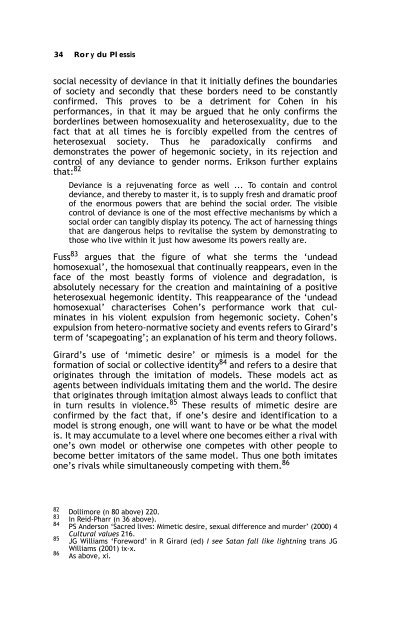Sex, Gender, Becoming - PULP
Sex, Gender, Becoming - PULP
Sex, Gender, Becoming - PULP
Create successful ePaper yourself
Turn your PDF publications into a flip-book with our unique Google optimized e-Paper software.
34 Rory du Plessis<br />
social necessity of deviance in that it initially defines the boundaries<br />
of society and secondly that these borders need to be constantly<br />
confirmed. This proves to be a detriment for Cohen in his<br />
performances, in that it may be argued that he only confirms the<br />
borderlines between homosexuality and heterosexuality, due to the<br />
fact that at all times he is forcibly expelled from the centres of<br />
heterosexual society. Thus he paradoxically confirms and<br />
demonstrates the power of hegemonic society, in its rejection and<br />
control of any deviance to gender norms. Erikson further explains<br />
that: 82<br />
Deviance is a rejuvenating force as well ... To contain and control<br />
deviance, and thereby to master it, is to supply fresh and dramatic proof<br />
of the enormous powers that are behind the social order. The visible<br />
control of deviance is one of the most effective mechanisms by which a<br />
social order can tangibly display its potency. The act of harnessing things<br />
that are dangerous helps to revitalise the system by demonstrating to<br />
those who live within it just how awesome its powers really are.<br />
Fuss 83 argues that the figure of what she terms the ‘undead<br />
homosexual’, the homosexual that continually reappears, even in the<br />
face of the most beastly forms of violence and degradation, is<br />
absolutely necessary for the creation and maintaining of a positive<br />
heterosexual hegemonic identity. This reappearance of the ‘undead<br />
homosexual’ characterises Cohen’s performance work that culminates<br />
in his violent expulsion from hegemonic society. Cohen’s<br />
expulsion from hetero-normative society and events refers to Girard’s<br />
term of ‘scapegoating’; an explanation of his term and theory follows.<br />
Girard’s use of ‘mimetic desire’ or mimesis is a model for the<br />
formation of social or collective identity 84 and refers to a desire that<br />
originates through the imitation of models. These models act as<br />
agents between individuals imitating them and the world. The desire<br />
that originates through imitation almost always leads to conflict that<br />
in turn results in violence. 85 These results of mimetic desire are<br />
confirmed by the fact that, if one’s desire and identification to a<br />
model is strong enough, one will want to have or be what the model<br />
is. It may accumulate to a level where one becomes either a rival with<br />
one’s own model or otherwise one competes with other people to<br />
become better imitators of the same model. Thus one both imitates<br />
one’s rivals while simultaneously competing with them. 86<br />
82 Dollimore (n 80 above) 220.<br />
83 In Reid-Pharr (n 36 above).<br />
84<br />
PS Anderson ‘Sacred lives: Mimetic desire, sexual difference and murder’ (2000) 4<br />
85<br />
Cultural values 216.<br />
JG Williams ‘Foreword’ in R Girard (ed) I see Satan fall like lightning trans JG<br />
86<br />
Williams (2001) ix-x.<br />
As above, xi.
















